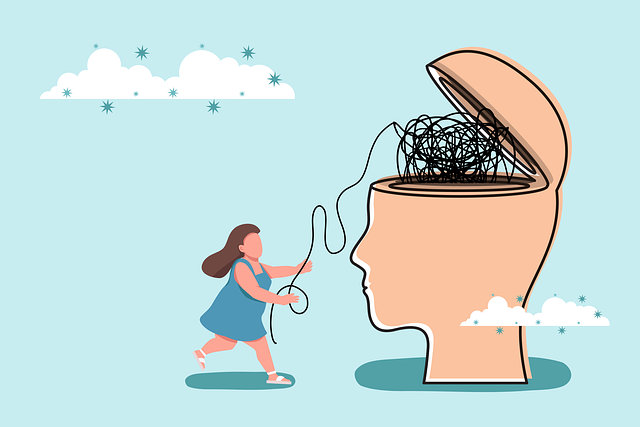Early recognition of depression in young children is crucial through identifying subtle behavioral, emotional, and physical signs. Parenting strategies like open communication and mindfulness meditation are key. Somatic Experiencing, a holistic therapy tailored for kids, focuses on processing trauma and building inner strength to prevent depression by using techniques like deep breathing and body scans. Creating a supportive environment with social connections, mental health resources, and therapeutic approaches enhances resilience through stress management workshops, journaling, exercise, and self-awareness exercises. Organizations should collaborate with schools and families to implement these initiatives holistically for youth well-being.
Depression among young children is a growing concern, but with proactive strategies, we can foster resilience and promote mental well-being. This article explores three effective prevention methods. We delve into recognizing early signs of depression in young children, highlighting the power of somatic experiencing—a holistic approach using body-focused therapy for kids. Additionally, creating supportive environments for vulnerable youth is crucial, emphasizing community engagement and accessible resources to combat this prevalent issue.
- Recognizing Early Signs of Depression in Young Children
- Somatic Experiencing: A Holistic Approach to Prevention
- Creating a Supportive Environment for Vulnerable Youth
Recognizing Early Signs of Depression in Young Children

Recognizing depression early on in young children is crucial for effective prevention and treatment. While they may not articulate their feelings as adults do, kids can still exhibit subtle signs of distress. Changes in behavior, such as withdrawal from social activities or sudden interest in activities they once disliked, could be indicators. Emotional shifts, like frequent crying or extreme irritability, along with physical symptoms like chronic fatigue or changes in appetite, should raise concern.
Parenting plays a vital role in spotting these early signs. Encouraging open communication and actively listening to children can help. Therapy for young children, such as Somatic Experiencing, focuses on helping them process traumatic experiences and develop inner strength. Additionally, promoting mindfulness meditation and empathy-building strategies at home can foster emotional well-being. These approaches empower kids to manage their emotions effectively, potentially preventing the onset of depression.
Somatic Experiencing: A Holistic Approach to Prevention

Somatic Experiencing is a holistic approach to depression prevention that focuses on the connection between the mind and body. This therapy for young children emphasizes the importance of understanding and resolving traumatic experiences, which can often be at the root of mental health issues. By addressing physical responses to trauma, Somatic Experiencing helps build resilience and promotes mental wellness, thereby enhancing mental health awareness among children.
The method employs various techniques such as deep breathing exercises, body scans, and guided movements to help individuals process and release stored traumas. This hands-on approach aims to restore the body’s natural state of equilibrium, which can be disrupted by adverse experiences. Through Somatic Experiencing, children can learn to regulate their emotions, develop coping mechanisms, and cultivate a stronger sense of self, thereby fostering resilience in the face of life’s challenges.
Creating a Supportive Environment for Vulnerable Youth

Creating a supportive environment is paramount for vulnerable youth to prevent and manage depression. This includes fostering strong social connections and providing access to appropriate mental health resources, such as therapy for young children. Somatic Experiencing, a therapeutic approach that focuses on resolving traumatic stress, has proven effective in enhancing resilience and promoting mental wellness among adolescents. Encouraging open communication about emotions and implementing stress management workshops within schools can also create a safe space for self-expression and coping strategies.
Additionally, integrating practices like journaling and exercise guidance into daily routines can significantly contribute to improving youth’s mental health. Self-awareness exercises that teach mindfulness and emotional regulation skills are valuable tools in preventing depressive episodes. Organizations dedicated to mental wellness should prioritize these initiatives, collaborating with educational institutions and families to ensure a holistic approach that nurtures the well-being of our young people.
In conclusion, preventing depression in young individuals requires a multi-faceted approach. Recognizing early signs and providing support is crucial, while holistic methods like Somatic Experiencing offer promising avenues for treatment. By creating supportive environments and utilizing appropriate therapy, such as Somatic Experiencing tailored to young children, we can foster resilience and promote mental well-being, ensuring a brighter future for vulnerable youth.









